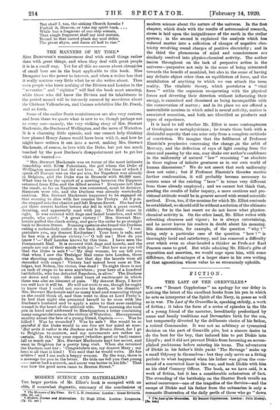THE MANNERS OF MY TIRE.*
Miss DEMPSTER'S reminiscences deal with small things rather than with great things, and when they deal with great people it is in a small way. Yet for all this no sneers about chronicles of small beer are in the least applicable to this book Miss Dempster has the power to interest, and when a writer has that it really matters very little what he or she writes about. Thus even people who knew nothing of the Riviera and London in the " seventies " and " eighties " will find the book most amusing, while those who did know the Riviera and its inhabitants in the period named will be intensely amused by anecdotes about the Château Vallombrosa, and Cannes celebrities like Dr. Frank, and so forth.
Some of the earlier Scots reminiscences are also very curious, and from these we quote what is new to us, though perhaps not to every one—namely, the very striking story of Mrs. Stewart Mackenzie, the Duchess of Wellington, and the news of Waterloo. It is a charming little episode, and one cannot help thinking how pleased Henry James would have been with it, and how he might have written it out into a novel, making Mrs. Stewart Mackenzie, of course, in love with the Duke, but yet too much touched by the poor Duchess's disappointment not to get her what she wanted :— " Mrs. Stewart Mackenzie was on terms of the moat intimate friendship with Kitty Pakenham, the girl whom the Duke of Wellington married but did not love. At the time of which I speak all Europe was on the qui vice, for Napoleon was already in Belgium, and the Duke was in Brussels with 80,000 men. What was to be the upshot of a meeting between the Emperor returned from Elba and the Allied armies 7 Everyone felt that the result, so far as Napoleon was concerned, must be decisive. Rumours were rife, and the Duchess was already wretchedly anxious. Mrs. Stewart Mackenzie happened to be engaged on that evening to dine with her cousins the Probys. At 6 p.m. she stepped into her chariot and left Bruton Street. She had nob got three streets farther before she fell in with a great crowd, shouting, and apparently mad with joy. The Mail came in sight. It was covered with flags and laurel branches, and with people, who cried : A great victory ! ' Mrs. Stewart Mac- kenzie pulled the check-string, and gave the order to go straight back to Bruton Street. Running upstairs she found the Duchess eating a melancholy cutlet in the back drawing-room. I con- gratulate you, my dearest Katherine I Your hero is safe, and he has won a glorious victory.'—' 0 tell me How do you know 7 Half London knows by this time. I have seen the Portsmouth Mail. It is covered with flags and laurels, and the people are out of their minds with joy.'—' But how can you tell that the Duke is safe 7 My dear woman, let me tell you that when I saw the Trafalgar Mail come into London, there was shouting enough then, but that day the laurels were all shrouded with crape ! Victory had indeed been ours at Tra falgar, but Nelson, the victor, was dead I To-night there is not an inch of crape to be seen anywhere ; your hero of a hundred battlefields, who has defeated Napoleon, is alive.' The Duchess sat down and wept. She cried tears of excitement in which there was also an element of pain. My dearest Mary, I know too well how it will be. He will not write to me, though he ought to know that I could not survive his death, or his disaster.' Mrs. Stewart Mackenzie said as many kind and reassuring things as she could think of, and then went to dine at Lord Proby's. In bed that night she promised herself to be even with the Duchess's husband and to apply a salve to that ever-rankling wound in the heart of the unloved wife. Next morning she took pen in hand and addressed to Headquarters a letter containing many congratulations on the victory of Waterloo. She expressed anxiety about the fate of a young friend, Captain —. Was he killed ? Was he wounded ? Was he safe ? She would be so grateful if the Duke would in one line set her mind at ease: 'But write it rather to the Duchess and to Bruton Street, for I go to Brighton to-morrow, and my movements are rather un- certain. In this way your report (whether good or bad) cannot fail to reach me.' Mrs. Stewart Mackenzie kept her secret, and went to Brighton for a pretty long visit. When she returned the Duchess met her : ' Congratulate me, my dearest Mary ; my hero is all that is kind ! You said that he would write. He has written I and I am such a happy woman. By the way, there is a message for you in the letter. He bids me tell you that young — never had a scratch, and never was better in his life.' That was how the good news came to Bruton Street."


































 Previous page
Previous page